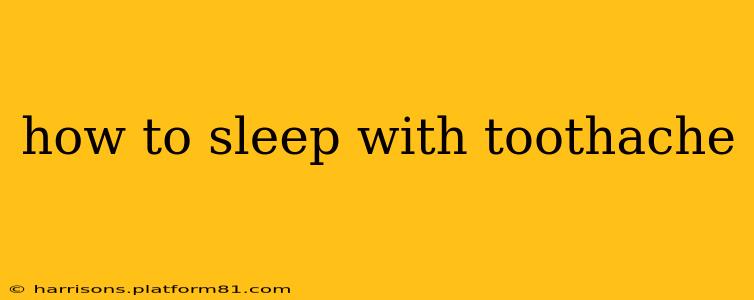A throbbing toothache can make sleep feel impossible. The pain is intense, disruptive, and can leave you exhausted and irritable. But there are ways to manage the discomfort and find some relief, allowing you to get the rest you desperately need. This guide explores effective strategies to help you sleep with a toothache, addressing common concerns and offering practical solutions.
What Causes Toothaches that Disrupt Sleep?
Before diving into solutions, understanding the root cause of your toothache is crucial. Several factors can contribute to tooth pain, including:
- Cavities: Decayed areas in your teeth expose the nerves, leading to intense pain.
- Abscesses: A bacterial infection at the root of a tooth can cause severe throbbing pain and swelling.
- Gum disease (gingivitis or periodontitis): Inflammation and infection of the gums can be very painful.
- Cracked or chipped teeth: Exposure of the dentin or pulp can cause sensitivity and pain.
- Teeth grinding (bruxism): This can wear down enamel and cause jaw pain, often radiating to the teeth.
- Sinus infection: Pressure from a sinus infection can sometimes manifest as tooth pain.
How Can I Get Rid of a Toothache Fast Enough to Sleep?
Unfortunately, there's no magic cure to instantly eliminate a toothache. However, several strategies can offer quick pain relief to help you get some sleep:
- Over-the-counter pain relievers: Ibuprofen (Advil, Motrin) or acetaminophen (Tylenol) can help reduce pain and inflammation. Always follow the dosage instructions on the label.
- Cold compress: Applying a cold compress or ice pack wrapped in a cloth to the affected area can numb the pain and reduce swelling. Apply for 15-20 minutes at a time, taking breaks to avoid tissue damage.
- Saltwater rinse: Gently rinsing your mouth with warm saltwater can help clean the area and reduce inflammation.
What Home Remedies Can Help Me Sleep with a Toothache?
Several home remedies may provide temporary relief:
- Clove oil: Clove oil contains eugenol, a natural anesthetic. Apply a small amount directly to the affected tooth using a cotton swab. Caution: Use sparingly, as it can irritate the gums.
- Peppermint tea bags: The cooling effect of peppermint can soothe the pain. Apply a chilled, damp tea bag to the affected area.
- Elevation: Elevating your head with an extra pillow can help reduce swelling and pressure on the tooth.
Can I Use Topical Anesthetics for Toothache Pain Relief Before Bed?
Yes, topical anesthetics like Orajel or Anbesol can provide temporary numbing relief. These are readily available at most pharmacies and can be applied directly to the affected area. Remember to follow the instructions on the packaging. They offer short-term relief, but don't address the underlying cause of the toothache.
What Should I Do If My Toothache Keeps Me Awake?
If your toothache persists despite home remedies and over-the-counter medications, or if you experience severe pain, swelling, fever, or difficulty opening your mouth, seek professional dental care immediately. Delaying treatment can worsen the condition and lead to more serious complications.
When Should I See a Dentist for a Toothache?
Don't delay seeking professional help if:
- The pain is severe and doesn't respond to home remedies.
- You have swelling or fever.
- You have difficulty opening your mouth.
- The pain lasts for more than a few days.
- You notice any signs of infection.
Ignoring a persistent toothache can lead to more serious problems, including abscesses, bone loss, and even the need for tooth extraction. A dentist can diagnose the cause of your pain and provide appropriate treatment.
Conclusion: Prioritizing Rest and Seeking Professional Help
A toothache can be incredibly disruptive, preventing you from getting the restful sleep you need. While home remedies can offer temporary relief, remember that professional dental care is essential for addressing the underlying cause and preventing further complications. Prioritize your oral health, and don't hesitate to seek help from a dentist for persistent or severe tooth pain. Getting adequate sleep is vital for your overall health and well-being, and addressing your toothache is a crucial step towards achieving that.
